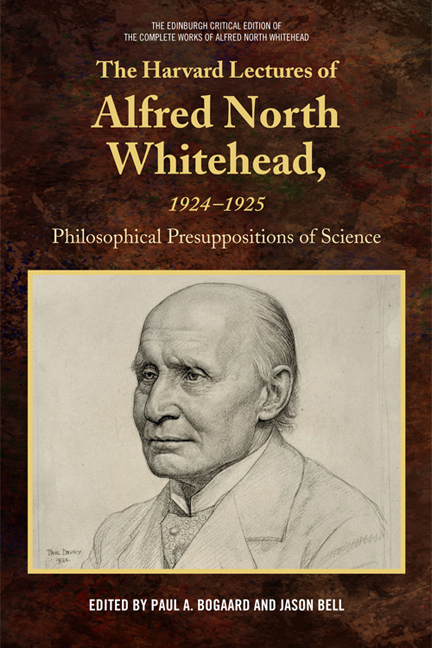Book contents
- Frontmatter
- Contents
- General introduction
- Editorial principles
- Acknowledgements
- Chronology for Alfred North Whitehead
- Published works of Alfred North Whitehead
- Introduction to The Harvard Lectures of Alfred North Whitehead, 1924–1925
- Emerson Hall lectures, Harvard Yard, 1924–1925: Notes taken by W. P. Bell and W. E. Hocking on Phil 3b, ‘Philosophical Presuppositions of Science’, delivered by Alfred North Whitehead
- Radcliffe College lectures, 1924–1925: Notes taken by Louise R. Heath on Phil 3b, ‘Philosophical Presuppositions of Science’, delivered by Alfred North Whitehead
- Whitehead Seminary, 1924–1925: Notes taken by W. E. Hocking on Phil 20h, ‘Seminary in Metaphysics’, delivered by Alfred North Whitehead
- Appendix. Scans of original handwritten notes
- Index
General introduction
Published online by Cambridge University Press: 07 December 2017
- Frontmatter
- Contents
- General introduction
- Editorial principles
- Acknowledgements
- Chronology for Alfred North Whitehead
- Published works of Alfred North Whitehead
- Introduction to The Harvard Lectures of Alfred North Whitehead, 1924–1925
- Emerson Hall lectures, Harvard Yard, 1924–1925: Notes taken by W. P. Bell and W. E. Hocking on Phil 3b, ‘Philosophical Presuppositions of Science’, delivered by Alfred North Whitehead
- Radcliffe College lectures, 1924–1925: Notes taken by Louise R. Heath on Phil 3b, ‘Philosophical Presuppositions of Science’, delivered by Alfred North Whitehead
- Whitehead Seminary, 1924–1925: Notes taken by W. E. Hocking on Phil 20h, ‘Seminary in Metaphysics’, delivered by Alfred North Whitehead
- Appendix. Scans of original handwritten notes
- Index
Summary
Alfred North Whitehead, a British-born philosopher who attained widespread fame in America in the first half of the twentieth century, is perhaps best known among the wider public for his famous saying that the European philosophical tradition ‘consists of a series of footnotes to Plato’.
A student of mathematics at Trinity College, Cambridge, in the 1880s, Whitehead was elected a Fellow of the College in 1884, where he mentored the mathematical studies of such notable figures as John Maynard Keynes and Bertrand Russell, and was also inducted as a member of one of the most elite societies in the English-speaking university world at the time, the famed ‘Cambridge Apostles’.
In 1910, Whitehead resigned his fellowship at Trinity College and moved to London, where (after a year spent in research and writing) he obtained a lectureship in mathematics at University College London. In 1914, he began lecturing at the newly organised Imperial College of Science and Technology (now Imperial College London) before being elected Dean of the Faculty of Science at the University of London in 1918 and Chairman of its Academic Council in 1920.
While at the University of London, Whitehead successfully lobbied for a new history of science department, helped establish a bachelor of science degree in 1923, and made the school more accessible to less wealthy students. Finally, at the age of 63, Whitehead retired from his position at the University of London and sailed to America to accept a coveted chair at Harvard University, becoming a naturalised citizen and remaining an active and prolific scholar until his death on 30 December 1947 in Cambridge, Massachusetts.
At the beginning of the twentieth century, Whitehead began a collaboration with his student and protege Lord Bertrand Russell that lasted well over a decade and resulted in the publication (in 1910, 1912 and 1913) of the three-volume Principia Mathematica, a monumental study intended to establish the foundations of mathematics in formal logic. Subsequently, in 1922, Whitehead himself concluded two decades of study of the geometry of space-time in The Principle of Relativity, a path-breaking work of theoretical cosmology explicitly intended to pose an alternative to Albert Einstein's General Theory.
- Type
- Chapter
- Information
- The Harvard Lectures of Alfred North Whitehead, 1924-1925Philosophical Presuppositions of Science, pp. vii - xiiPublisher: Edinburgh University PressPrint publication year: 2017



